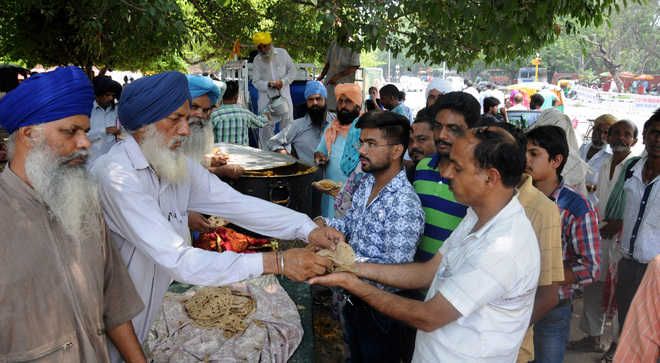
Volunteers offer free meals to patients and attendants outside the PGI, Chandigarh. File photo
Rakesh Kochhar
INDIA fares poorly on the health index. With only 1% of GDP being spent on health and a shortage of six lakh doctors, we are way off the desired standards. Added to this is the rural-urban divide with more than 80 per cent of doctors serving in urban areas, whereas 70 per cent of population residing in villages.
A number of suggestions have been made to improve the situation. These include barefoot doctors, bridge course for AYUSH doctors, dentists and compulsory rural posting of all fresh MBBS graduates, among others. All these have been non-starters.
Charitable health facility
Recently I happened to visit a charitable health facility in the tricity, which was an eye-opener. Run by a temple, the facility has added a physician, a gynaecologist, a paediatrician, an orthopaedician and an ophthalmologist, besides a nutritionist, physiotherapist and a yoga expert who doubles as a motivational speaker.
Recently a blood test auto-analyser was added. All consultations are free and the lab charges are nominal. At a function to felicitate the selfless service of the staff, a suggestion to add an ultrasound machine was made and instantly a member in the audience offered to pay for it. It was gratifying to see people donating money for a noble cause. An orthopaedician in his address said he visualised a 100-bed hospital in the near future. Seeing the response of the gathering, it looked a distinct possibility.
Relief for needy
The experience set me thinking if indeed such charitable facilities held hope for the future. There are a number of consultants associated with many gurudwaras and a few temples in the city who offer consultation which is bereft of any vested interest. Some clinics have added diagnostic laboratories, which, however, do not always match the desired standards.
However, basic tests like that for diabetes and kidney and liver diseases are generally available. This is a great help for people who cannot pay exorbitant charges at private hospitals and who find most government dispensaries and hospitals crowded as over 75 per cent to 80 per cent of the common illness can be handled easily by such charitable clinics. Most importantly, you are likely to get honest opinion at such facilities.
Going the extra mile
The dedication and commitment of the staff of some of the charitable clinics is praiseworthy. I met a gynaecologist who said she was at times busy all seven days of the week as she would go to different charity clinics on week days and go for rural camps on some Sundays. Limitations of such charitable clinics include limited availability of specialist doctors and non-availability of surgical facilities.
While many temples and gurdwaras run charitable clinics, there are only a few larger hospital services run on charity. Among the latter are the Sri Sathya Sai Hospitals at Puttaparthi and Bangalore and four hospitals run by Radha Soami Satsang in Beas and other cities in North India. I am aware of similar facilities run by Ramakrishna Mission and many churches across the country.
If all religious places in India take it upon themselves to provide health facilities to the needy, it can indeed make a difference for the common man. There are enough government doctors who, after retirement, are willing to share their expertise with such facilities. Many private doctors are also more than keen to help. What motivates doctors to pitch in is the desire to give back to society. The same holds true for funds to run charity clinics as many philanthropists are eager to help the needy. Moreover, if needed, a part of the offerings to the temples/churches/gurdwaras can be used to set up infrastructure.
Skeptics would tend to question the sincerity and honesty of people involved in such ventures. I think that apprehension can be allayed by formation of managing committees or trusts to run the clinics or hospitals.
I am sure we will see more activity in the field of charity and philanthropy for health in the coming years. The corporate world could also contribute through the corporate social responsibility. So also could the MLAs and MPs through their area-development funds.
Selfless service and their act of kindness
- The concept of charity clinics and hospitals is in accordance with Indian ethos - to help the needy. There are a number of organisations giving free food to patients and attendants outside the PGI and the GMCH-32.
- Many buses are run daily free of cost for patients from places as far as 100-150 km in Punjab and Himachal Pradesh.
The writer is a Professor and Head of the Department of Gastroenterology, PGIMER, Chandigarh



























